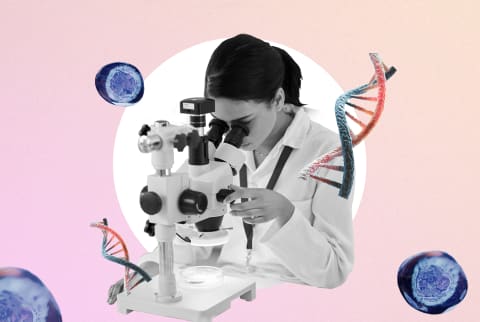Advertisement
Sirtuins Are Critical For Cellular Health—What Are They & How Do They Work With NAD?


When you look in the mirror, you're actually looking at 100 trillion cells—but when was the last time you thought about how those cells are doing? The health of your cells, after all, literally dictates how well your body works.
But since cellular health naturally declines over time—contributing to signs of aging and age-related disease—focusing on your cells is key for promoting healthy aging.
You can do this by supporting your sirtuins, some of the most important enzymes in the body. Here's the lowdown.
What are sirtuins?
Sirtuins are a group of proteins. Specifically, they're a family of enzymes, also known as biological catalysts. This means they work to speed up certain chemical reactions.
Now, your body has a lot of enzymes, but sirtuins are exceptionally remarkable. "Sirtuins play an important role in managing healthy cellular functioning," explains Kate Denniston, N.D., a licensed naturopathic doctor and founder of Los Angeles Integrative Health. They're involved in a wide variety of cellular processes involved in aging, along with diseases associated with age.
But sirtuins can't do their thing alone. They're totally dependent on a molecule called nicotinamide dinucleotide (NAD+). (We'll elaborate on this guy in a bit.) In fact, without NAD+, sirtuins are unable to carry out their enzymatic duties.
To date, seven sirtuins1 have been identified in mammals thus far. All seven sirtuins boast similar structural characteristics, but each one works in different ways. That's because sirtuins—like all enzymes—are highly selective.
In other words, each sirtuin specializes in regulating unique (and crucial) cellular functions. You can think of sirtuins as a family whose members are physically similar but have different talents.
Why are sirtuins so critical for cellular health?
When it comes to the game of cellular aging, sirtuins are like the referees. They slow down cellular senescence2 (a fancy word for when cells stop dividing) by controlling numerous cellular functions. In turn, sirtuins affect "your cellular health across a wide variety of organs and systems," says Vikki Petersen, D.C., CCN, CFMP, certified functional medicine practitioner and founder of Root Cause Medical Clinic.
For starters, sirtuins help repair DNA damage3, the main cause of cellular senescence. This includes damage like oxidative stress, one of your cells' worst enemies. Sirtuins also delay the shortening of telomeres, the DNA "caps" at the ends of a chromosome. (The natural process of aging is due to telomere shortening, by the way.)
Additionally, sirtuins regulate "mitochondrial biogenesis, or the creation of new mitochondria," says Petersen. "[These] are the power plants of your cells," which means they produce the energy your cells need to function. Sirtuins also "improve the connection between the nucleus and mitochondria so that the mitochondria work better," adds Denniston.
But that's not all. These vital enzymes are necessary for normal cellular metabolism and homeostasis, too. They also "inhibit inflammation, mobilize fats, and regulate the release of insulin," notes Petersen. With that said, it's unsurprising that sirtuins are implicated in the development of many chronic conditions—from cardiovascular diseases (like hypertension) and neurodegenerative diseases (like Alzheimer's). Let's just say healthy aging simply isn't possible without these essential enzymes.
How does NAD+ support sirtuins?
So, about that NAD+. It's a critical coenzyme, which means sirtuins need it to function4. They use NAD+ to remove specific chemical structures from cellular proteins, says Petersen. This is precisely what allows them to control various cellular mechanisms.
What's more, "changes in NAD+ levels affect sirtuin activity," shares Denniston. Whereas higher levels of NAD+ increase their activity, lower levels have the opposite effect. The latter typically happens during aging, disrupting how the nucleus and mitochondria communicate4. Essentially, without enough NAD+ in the arena, sirtuins can't function properly.
How can I support my body's sirtuins?
As we get older, our levels of NAD+ naturally decline. According to Petersen, it's primarily depleted across various energy-demanding tissues, including your brain, heart, and skeletal muscle. "When you're young and NAD+ levels are in ready supply, your tissues function optimally," she explains. But "when you can't meet the demand for NAD+, tissues start to fall apart."
Without enough NAD+, your body's sirtuin function is limited as well. But fortunately, it's possible to support your NAD+ (and therefore, sirtuins) by supplementing with nicotinamide riboside5 (NR). "NR is a derivative of niacin (vitamin B3) and a precursor to NAD+," explains Denniston. In the body, NR is converted into nicotinamide mononucleotide (NMN) and then to NAD+, says Petersen. Because of their effect on NAD+, NR supplements are known as NAD+ enhancers. However, in order to effectively affect your sirtuins, it's best to use high-quality NR supplements, notes Petersen.
As for how to take them? "Take these in the morning and early afternoon, when you're more active. Taking them in the evening could interrupt sleep," she adds. Other than taking an high-quality NR supplement, you can support your sirtuins even more; Petersen recommends focusing on resveratrol. This polyphenol, or plant chemical, is a potent sirtuin-activating compound. It's mainly found in cacao, blueberries, cranberries, and red grapes, says Denniston.
The take-away
When you're young, your sirtuins work hard to protect your cells and DNA. But as their function declines over time, it's important to return the favor by supplementing with NR and leading a healthy, balanced lifestyle. By doing so, you can pave the way for longevity and optimal aging. As Denniston reminds us, "If our cells are healthy, we are healthy."